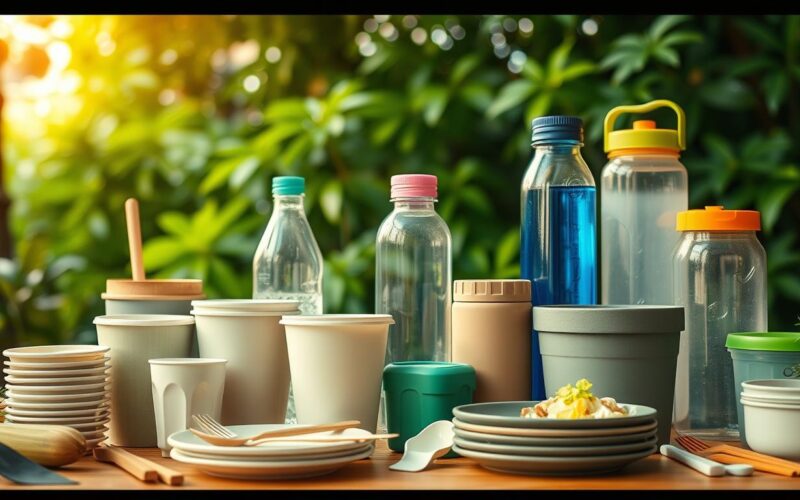Did you know that over 14 million tonnes of microplastics are currently polluting the ocean floor1? This alarming statistic highlights the urgent need to rethink our daily habits. From plastic wraps to disposable coffee cups, these items are filling landfills and harming our planet.
Plastic is everywhere, from the kitchen to the bathroom. It’s in our food containers, water bottles, and even our shampoo bars. But there’s a better way. By choosing sustainable options like Beeswax Wraps, stainless steel containers, and reusable coffee cups, we can make a significant difference.
Small changes at home can lead to big impacts. Swapping out plastic for glass, bamboo, or organic cotton products reduces waste and protects the environment. It’s time to take action and embrace a cleaner, healthier lifestyle.
Key Takeaways
- Plastic waste is a major environmental issue, with millions of tonnes polluting oceans and landfills.
- Simple swaps like using Beeswax Wraps or stainless steel containers can reduce plastic use.
- Reusable items like coffee cups and shopping bags help cut down on trash.
- Choosing sustainable materials like bamboo and glass supports a healthier planet.
- Every small change at home contributes to a larger positive impact.
Exploring Eco-Friendly Alternatives for Everyday Living
Every year, millions of plastic items end up in landfills, harming ecosystems and wildlife. From food packaging to personal care products, plastic is deeply embedded in our daily lives. Understanding its impact is the first step toward making meaningful changes.
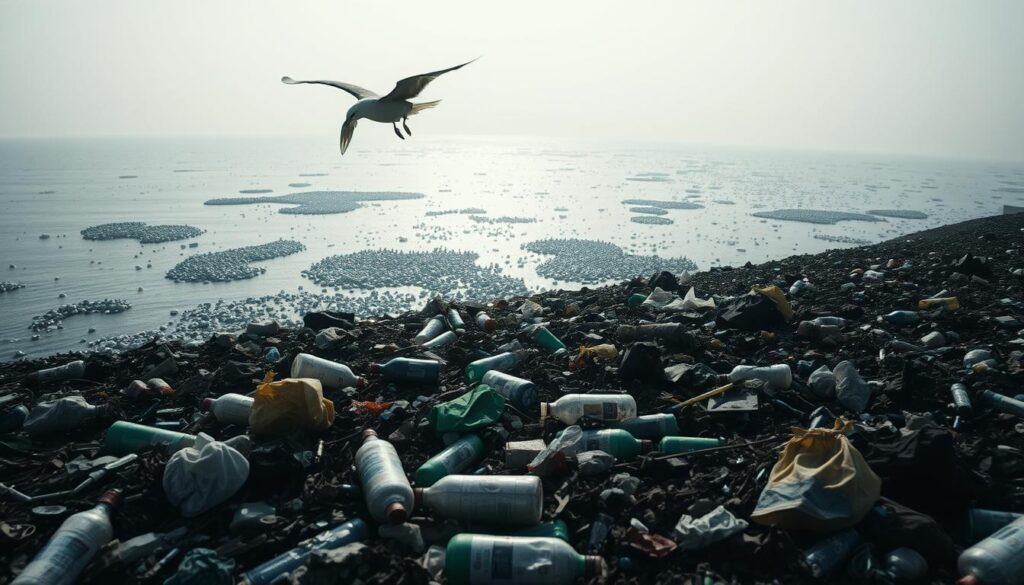
Understanding the Impact of Plastic Waste
Plastic waste is a major contributor to environmental pollution. For example, traditional plastic bags can take hundreds of years to decompose, while compostable bags break down naturally in a compost environment2. This stark difference highlights the need for better choices.
Supermarket shelves are filled with plastic-wrapped goods, many of which are non-recyclable. These items often end up in landfills, where they release harmful chemicals into the soil and water3. Reducing this waste starts with awareness and action.
Why Sustainable Choices Matter
Switching to reusable and biodegradable products can significantly reduce waste. For instance, beeswax wraps can replace traditional plastic wraps, which contribute to plastic pollution2. Small changes like this add up over time.
Choosing materials like glass or stainless steel over plastic containers also makes a difference. These options are not only durable but also free from harmful chemicals that can leach into food2. Making informed decisions helps protect both our health and the planet.
Consumer awareness plays a crucial role in fostering a future with reduced plastic waste. By supporting sustainable products, we can drive demand for better options and create a cleaner, healthier world.
Sustainable Swaps for Household Essentials
Everyday plastic products are filling landfills, but there’s a better way. Over 70% of household plastic waste can be replaced with reusable or compostable options4. Making simple swaps in your kitchen and home can significantly reduce your environmental footprint.
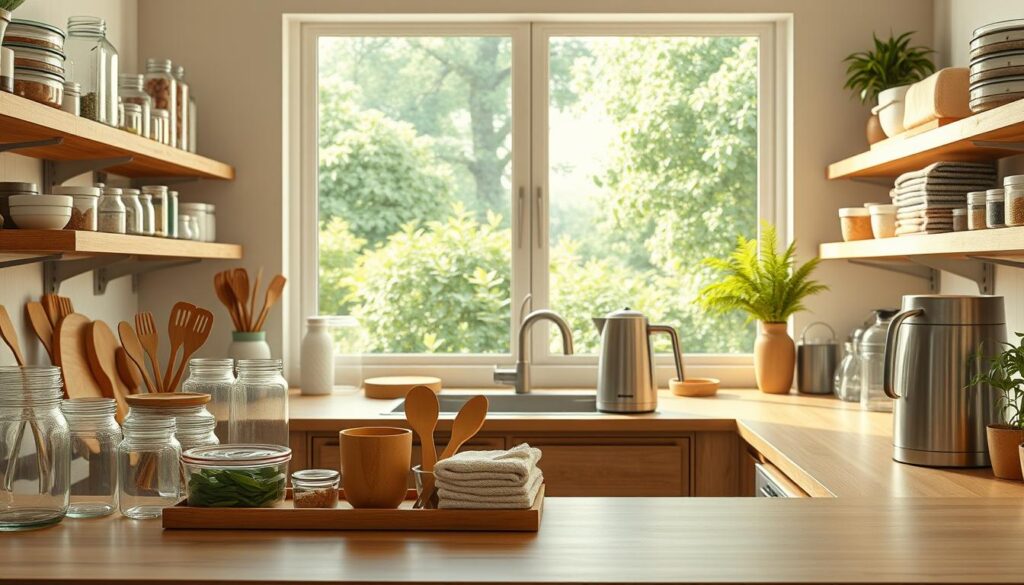
Replacing Plastic Containers with Glass and Stainless Steel
Plastic containers are convenient but often end up in landfills. Glass and stainless steel containers are durable, non-toxic, and reusable. They keep food fresh without leaching harmful chemicals5.
Switching to these materials is easy. Start by replacing one item at a time. For example, use glass jars for pantry storage or stainless steel lunch boxes. These changes not only reduce waste but also improve organization in your kitchen.
From Disposable Wraps to Beeswax and Cotton Covers
Disposable cling film is a major contributor to plastic waste. Beeswax wraps and cotton covers are excellent replacements. They are reusable, biodegradable, and easy to clean5.
Transitioning to these products is simple. Wait until your current wraps run out, then switch to beeswax or cotton options. These covers are perfect for wrapping sandwiches, covering bowls, or storing produce.
- Glass containers: Reusable and free from harmful chemicals.
- Stainless steel: Durable and ideal for food storage.
- Beeswax wraps: Biodegradable and long-lasting with proper care.
- Cotton covers: Washable and compostable at the end of their life.
These swaps not only benefit the environment but also enhance your home’s functionality. By choosing sustainable options, you’re making a positive impact on the planet.
Eco-Friendly Alternatives in Personal Care and Hygiene
Personal care products are a significant source of plastic waste, but sustainable options are on the rise. From shampoo bars to natural soaps, these alternatives are not only better for the planet but also healthier for you. Many brands are now prioritizing transparency and reducing harmful chemicals in their products6.
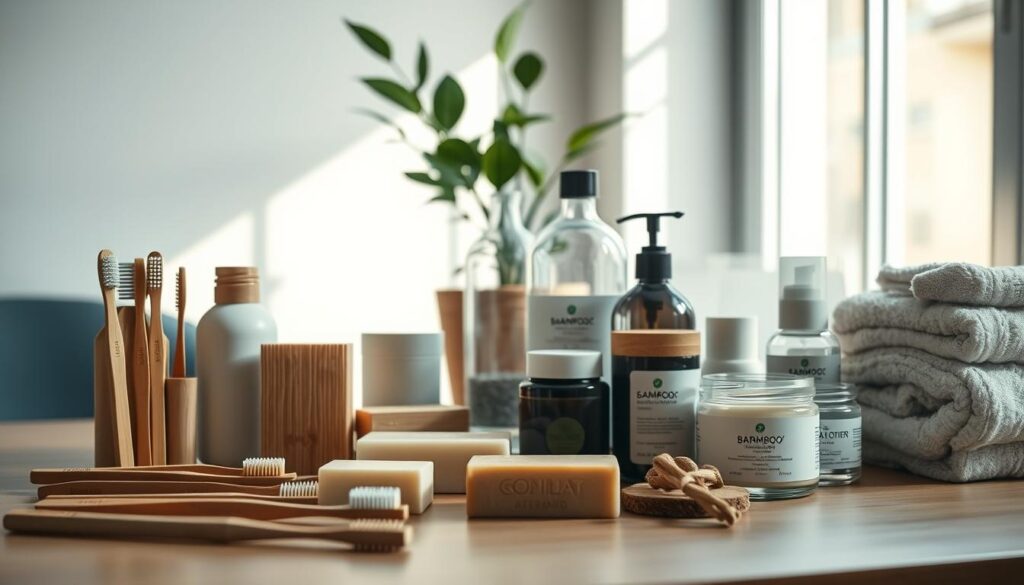
Shampoo Bars and Natural Soaps Over Plastic Bottles
Shampoo bars and natural soaps are gaining popularity as effective replacements for liquid products in plastic bottles. These solid options are lightweight, reducing transportation costs and carbon emissions7. They also last longer, minimizing waste and saving money.
Brands like AVEDA and L’Occitane are leading the way by using 100% post-consumer recycled materials in their packaging8. This shift not only reduces plastic use but also supports a circular economy.
Reusable and Biodegradable Beauty and Dental Products
Reusable and biodegradable options are transforming the beauty and dental care industry. For example, Georganics offers toothpaste in glass jars, eliminating the need for plastic tubes7. These products are designed to be refilled or composted, reducing landfill waste.
Consumers are also gravitating toward natural ingredients, which are safer for both the body and the environment6. By choosing these alternatives, you can enjoy a cleaner, toxin-free routine while supporting sustainability.
- Shampoo bars: Long-lasting and plastic-free.
- Natural soaps: Free from harmful chemicals and biodegradable.
- Glass containers: Reusable and recyclable for dental and beauty products.
- Refillable options: Reduce packaging waste and encourage reuse.
Making these small changes in your personal care routine can have a big impact on reducing plastic waste and protecting the environment.
Innovative Material Choices and Packaging Solutions
Innovative materials are reshaping the way we think about packaging and everyday products. From bamboo to bioplastics, these solutions are reducing reliance on traditional plastic and promoting sustainability. Companies and consumers alike are embracing these changes for a cleaner future.
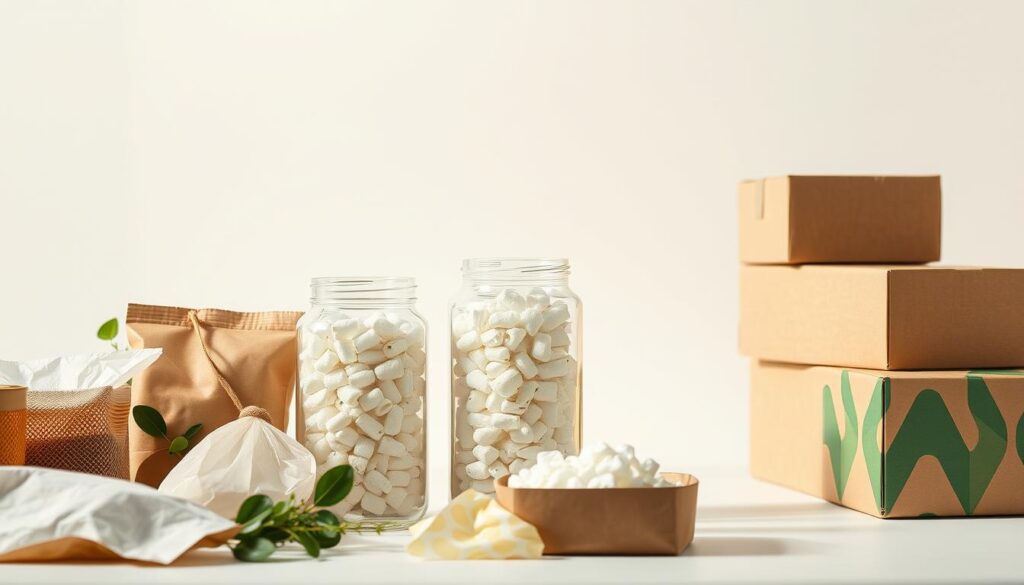
Bamboo, Organic Cotton, and Natural Fiber Options
Bamboo is a standout material due to its rapid growth and versatility. It’s used in everything from utensils to textiles, offering a durable and renewable option9. Organic cotton, another sustainable choice, is ideal for reusable bags and clothing, reducing the need for synthetic fibers10.
Natural fibers like hemp and jute are also gaining traction. These materials are biodegradable and require less energy to produce compared to plastic11. They’re perfect for packaging, home goods, and even construction materials.
Exploring Bioplastics and Alternative Packaging Materials
Bioplastics, made from renewable sources like corn and sugarcane, are emerging as a viable alternative to traditional plastic. They’re biodegradable under proper conditions and have a lower carbon footprint10. However, challenges like cost and recycling infrastructure remain.
Innovative packaging solutions are also making waves. Mushroom-based packaging, for example, uses mycelium to create biodegradable materials that provide excellent insulation9. Seaweed-derived packaging is another breakthrough, offering edible and compostable options11.
Glass and metal containers continue to be highly sustainable choices. They’re recyclable indefinitely without losing quality, making them ideal for food storage and shipping10.
These innovative materials are not just reducing waste but also driving a shift toward a circular economy. By choosing sustainable options, we can protect the planet and support businesses committed to positive change.
Practical Tips for Reducing Plastic Waste
Reducing plastic waste starts with simple, actionable steps at home. By making small changes, you can significantly decrease your reliance on single-use plastics and contribute to a cleaner environment. Here are some practical strategies to help you get started.
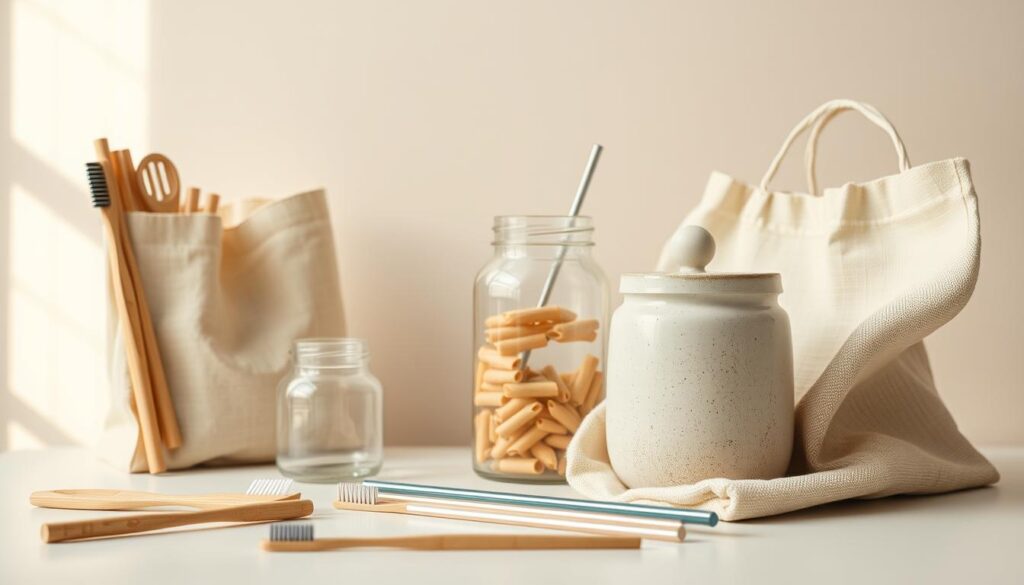
Guidelines for Adopting DIY and Natural Home Solutions
Creating your own cleaning products is an effective way to cut down on plastic packaging. For example, a multi-purpose spray can be made with vinegar, water, and a few drops of essential oil. This simple solution replaces store-bought cleaners that often come in plastic bottles12.
Repurposing household items is another great strategy. Old rags can replace paper towels, and glass jars can be used for storage instead of plastic containers. These small swaps not only reduce waste but also save money in the long run.
Effective Strategies for Sustainable Living in the U.S.
Switching to reusable items is a powerful way to minimize plastic use. For instance, using a reusable coffee cup can save hundreds of disposable cups each year12. Similarly, carrying a reusable water bottle helps avoid single-use plastic bottles, which take up to 450 years to decompose12.
Here are more actionable tips:
- Reusable bags: Keep a few in your car or bag to avoid plastic shopping bags.
- Safety razors: Swap disposable razors for durable, long-lasting options.
- Biodegradable dog poo bags: Choose these over traditional plastic bags.
- Rechargeable batteries: Reduce waste by opting for rechargeable options.
By adopting these practices, you can make a meaningful impact on reducing plastic waste. Every small change adds up, creating a healthier home and a cleaner environment for everyone.
Conclusion
Taking small steps today can lead to a cleaner tomorrow. By swapping everyday items like plastic bags for reusable ones or choosing cotton wraps over cling film, you can make a significant impact. These changes not only reduce waste but also support a healthier planet13.
Every action counts. Using a reusable water bottle or coffee cup can save hundreds of single-use items each year. These simple swaps are easy to adopt and can inspire others to do the same13.
Together, we can create a future with less plastic. Start by making one change today, and encourage your community to join the movement. A cleaner environment begins with each of us.
FAQ
What are the best materials to replace plastic containers?
How can I reduce plastic waste in my kitchen?
Are shampoo bars better than traditional shampoo bottles?
What are some sustainable options for personal care products?
How can I make my home more eco-friendly?
What are bioplastics, and are they a good alternative?
How can I adopt a more sustainable lifestyle in the U.S.?
What are some easy DIY solutions for reducing plastic waste?
Source Links
- 40 Ways to Be More Eco Friendly in 2025 | GreenMatch – https://www.greenmatch.co.uk/blog/how-to-be-more-eco-friendly
- Sustainable Living Essentials: 25 Essential Eco-Friendly Products You Cant Miss! – https://upcycleluxe.com/blogs/our-readers-digest/sustainable-living-essentials-25-eco-friendly-products-for-everyday-use?srsltid=AfmBOorw1WgoZEEBMyOxvWR3v8IcXIVe0Lx-TfxWchujcsJyf2lgNH2J
- 8 Eco-Friendly Paper Towel Alternatives to Try – https://www.reelpaper.com/blogs/reel-talk/paper-towel-alternatives?srsltid=AfmBOopuDOUdcsbEb9Fw-RDrXyoAZbVIieYm22xuaOVc0txZY-Fj3KLD
- 80+ sustainable zero waste swaps (eco-friendly on a budget) — Polly Barks – https://pollybarks.com/blog/easy-zero-waste-swaps
- 16 Sustainable Swaps for the Home – https://www.reelpaper.com/blogs/reel-talk/sustainable-swaps-for-the-home?srsltid=AfmBOoq3iGEUcEI8HQpNgoI1HXXUPSs4gfx0g5hUjI95TT1hjS-EjWi4
- Evolving beauty: The rise of sustainable cosmetics – https://www.cas.org/resources/cas-insights/the-rise-of-natural-ingredients-for-cosmetics
- Top 10 Sustainability Trends in Personal Care Products – CarbonBright – https://carbonbright.co/top-10-sustainability-trends-in-personal-care-products
- Top Eco-Friendly Skincare Products And Brands For 2024 | Worth – https://worth.com/best-sustainable-ecofriendly-skincare-products-brands/
- The top 10 must-have sustainable packaging solutions – https://www.packaging-gateway.com/features/sustainable-packaging-solutions-2/
- 6 ECO-FRIENDLY ALTERNATIVES TO PLASTIC PACKAGING | Packmile – https://www.packmile.com/insights/6-eco-friendly-alternatives-to-plastic-packaging/
- A Guide to Sustainable Packaging Solutions – https://www.greenbusinessbenchmark.com/resources/a-guide-to-sustainable-packaging-solutions
- 10 Effective Ways to Reduce Plastic Waste: From Personal Actions to Global Impact | Plastics For Change – https://www.plasticsforchange.org/blog/how-can-you-help-reduce-plastic-waste
- Eco-Friendly Alternatives to Everyday Household Items – https://www.refoorest.com/blog/2024/10/21/eco-friendly-alternatives-to-everyday-household-items/
